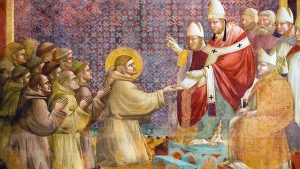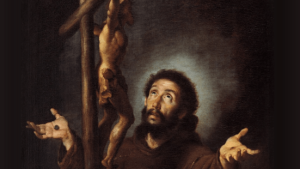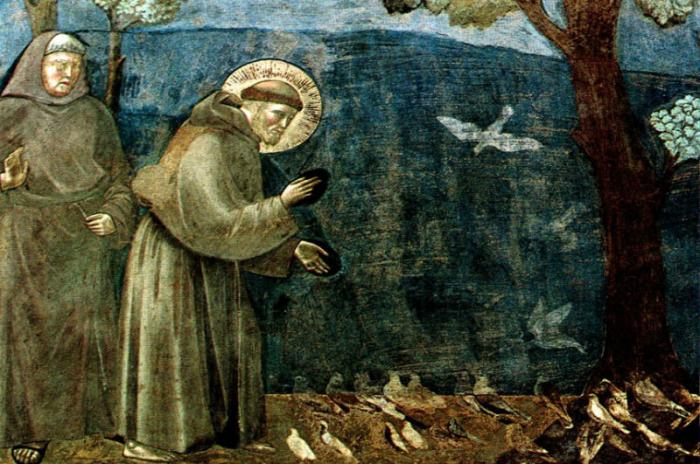Aleteia interviewed an authoritative Franciscan historian and theologian, who explains the meaning of these false attributions
Baleful papal prophecies that are added to many other phrases or expressions are attributed to him erroneously: if they were all true Saint Francis of Assisi it could end up in the eye of the Church’s storm. The authoritative Franciscan historian and theologian, Father Pietro Messa, dean of the Higher School of Medieval and Franciscan Studies of the Pontifical Antonianum Universityexplains ad Aleteia because these (not) prophetic facts have been attributed to the mouth and pen of St. Francis.
The interview
Q: Did Saint Francis ever speak or did he ever expressly address, in writings concerning him, to the Popes?
Father Mass: «In the Testament composed in 1226 a few months before his death, Francis affirms that after the revelation he had of living in the way of the Gospel he had this form of life written” in a few words and with simplicity “and the pope confirmed it to him (cf. Francis the Merciful, Holy Land Editions 2018) “.
“In the Rule he then says that” he promises obedience and reverence to Pope Honorius and his canonically elected successors and to the Roman Church “. Among his writings there is one to the rulers of peoples but none addressed to the popes and this because he always wanted to have the evangelical attitude of minority and ecclesial obedience not only towards the pope or the bishops but also towards simple priests ».
Public Domain
Q: What prophecies about Popes are attributed to St. Francis?
Father Mass: «In the century following that of Assisiate there was a very difficult moment for the Church, namely the Western schism (1378-1418) in which, in addition to a pope residing in Rome, there was one who lived in Avignon. For us today it is easy to say that the latter was an anti-pope but in those times it was not like that: just think that while the Franciscan Bernardino of Siena obeyed the Roman pontiff, the Poor Clare Colette di Corbie, canonized in 1807, was obedient to the one from Avignon ” .
“Well, to get out of this impasse it was decided to convene a council in Pisa and elect a real pope who would replace the two aforementioned contenders with the final result of having three popes, three colleges of cardinals, three obediences. As you can understand, the confusion was great and, within this great tribulation, there were those who wanted to instill hope by attributing to St. Francis a prophecy in which they spoke of such obscurity due to non-canonically elected popes. But, above all, that there would be a final victory for good ».
Q: Why is St. Francis called into question in these prophecies?
Father Mass: «The falsifications are always of objects and precious things such as gold, diamonds and so on. Similarly apocryphal writings are attributed to authoritative characters as previously happened for Saint Augustine or Saint Ambrose. From the moment of canonization, that is, canonical recognition of his holiness, Francis of Assisi is increasingly venerated and considered as a sure point of reference “.
“Taking advantage of his authority, he was attributed with various prophecies just as today sayings and expressions are put in his mouth that not only did not pronounce but are not even in harmony with his thought and spirituality”.
D: Of course the knowledge of history makes you understand many things!
Father Mass: «Many judgments such as those that describe the current ecclesial reality in a disastrous way are due to a lack of historical knowledge. In fact, the Church is always a pilgrim among the trials of life and the consolations of the Lord, in the tension between what has already been lived and what has not yet been accomplished. And in this the strongest temptation is discouragement while the theological virtue of hope is always to be begged and lived as a gift. The prophecies attributed to St. Francis have this theological perspective ».


Why is St. Francis attributed prophecies about Popes that have never been said?

